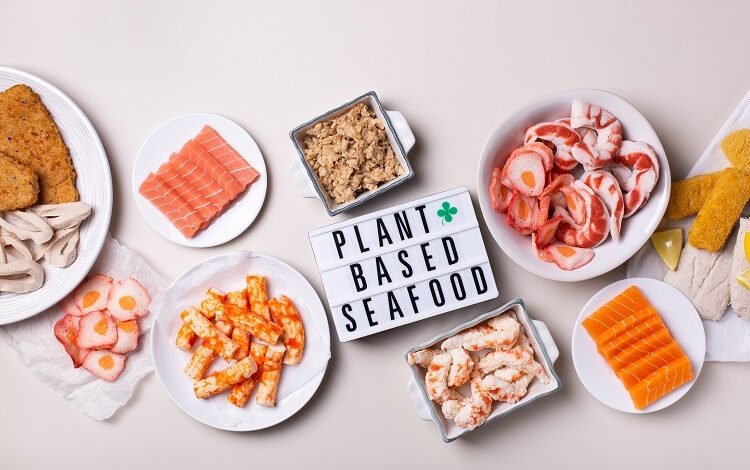How is the plant-based seafood industry innovating for the future?

Certain corners of the food industry have faced criticism in recent years, with consumers developing a greater understanding of what goes into the foods they eat and, how they are made. The plant-based industry, in particular, has come under scrutiny for the ultra-processing methods used to produce plant-based products.
This awareness has led to what has been termed the ‘plant-based backlash’ as consumer trust has been challenged, leading to some consumers turning away from these products entirely.
“Today, health is driving the category, with half of consumers (49%) concerned that meat alternatives are too processed, a concern heightened by the ever-growing scrutiny of ultra-processed foods,” Christopher Kong, CEO and co-founder of Better Nature, told FoodNavigator recently. “Instead, they’re looking for wholefood products with nutritional benefits such as high protein and gut friendly.”
So how is the plant-based seafood industry, which has also been subjected to this negative response, working to reformulate and innovate, in the hopes of winning consumers over once more?

How is the plant-based seafood industry innovating for the future?
The plant-based seafood industry is aware of the negative consumer response to many plant-based products. It is also acutely aware of the fact that demand for plant-based products is growing as supply of real seafood struggles to match demand.
“The basic fact is that demand is outstripping supply,” said Frankie Fox, CEO at plant-based seafood brand, FoodSquared, while speaking at the recent Future of Fish event in London. “Alternative protein, as well as protein diversification, has huge potential to bridge that gap, but so far, plant-based has not quite met the mark. Either it’s not available or what is available has not met consumer expectations.”
FoodSquared is a B2B food tech company, using a patent-pending process to create plant-based shellfish, starting with plant-based prawns.
“Our innovation is creating shellfish texture from plant protein,” says Fox.
Meanwhile Berlin-based start-up, Pacifico Biolabs, is creating seafood alternatives through mycelium fermentation.
“We’re a biotech company,” says Zac Austin, co-founder and CEO at Pacifico Biolabs. “What we’re doing, is we grow a strain of fungi and a strain of microalgae in bioreactors. Then we feed them what is essentially a side stream from agriculture – it’s not exactly food waste, but if you imagine the leftovers you get from something like sugar beet. And after 16 hours, we can harvest a batch of our protein.”
One of the most interesting aspects of this particular type of fish alternative is that it naturally tastes like fish.
“We’re naturally getting the seafood flavours through the algae,” explains Austin.
And Pacifico Biolabs is not the only German start-up to experiment with sea plants to create seafood.
Another Berlin-based brand, BettaF!sh, recently launched ‘SAL-NOM’, a plant-based alternative to hot-smoked salmon, made from seaweed. The product also contains fava beans and pea proteins.
“SAL-NOM is not just a product, it showcases our dedication to innovation, sustainability, and taste,” says Deniz Ficicioglu, CEO of BettaF!sh. “By leveraging the natural benefits of seaweed, we offer a fish alternative that is not only delicious but also significantly contributes to the protection of our oceans and personal health.”
However, some brands have been slightly slower to recognise the consumer shift away from ultra processed foods, as Colette Jessamy, head of product development at the Compleat Food Group and Squeaky Bean, illustrated, while discussing how the brand’s smoked salmon slices are created.
“There is a dried powder mix, which consists of starches, gums, rice flour, rice protein and some natural flavours. We then add some oil and water to this, to form an emulsion, and then it is put into a mould.”
What is the biggest barrier faced by the plant-based seafood industry?
The plant-based seafood industry is aware that cost is a major issue for consumers when it comes to making food choices.
“As the cost-of-living increases, many consumers are looking to cut the cost of their grocery shopping, and the first items to go are often those in a higher price bracket, which includes meat, dairy and plant-based meat substitutes,” Maisie Stedman, media and PR officer for The Vegan Society, told FoodNavigator.
Conversely, the wholefoods, which Christopher Kong previously referred to, have been faring better when it comes to consumer preference.
“In June 2022, our Live Vegan for Less campaign found a third of shoppers were cutting back on meat and dairy products in response to the cost-of-living, whilst our cost comparison research across the major supermarkets, showed that vegan sources of protein, such as dried lentils, peanut butter and baked beans, continued to be the cheapest options,” says The Vegan Society’s Stedman.
FoodNavigator recently reported that cost remains the number one priority for consumers, when it comes to choice. So, whether producers of plant-based seafood products can make these products affordable, without compromising on quality, is arguably one of the biggest challenges.
“We are looking to be a much lower in cost,” says FoodSquared’s Fox. “At least price parity, or lower, at scale.”
And this view is echoed across the industry.
“If you want people, who would otherwise eat fish, to substitute that once or twice a week, it needs to not cost them twice as much,” agrees Pacifico BioLabs’ Austin.




